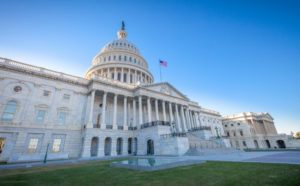Congress has finalized the conferenced version of the next defense policy bill, lawmakers said Wednesday, looking to move the process forward as the president doubles down on his threat to veto the legislation.
The final version of the fiscal year 2021 National Defense Authorization Act (NDAA) will not include a provision for stripping a social media-related regulation that the president said would be required for him to sign the bill, with legislators from both parties shooting down the idea of putting it in defense legislation.

“We have reached bicameral agreement on the FY21 NDAA, which authorizes funding for the Department of Defense and the national security programs of the Department of Energy. As is the case every year, this agreement is the product of months of hard-fought negotiations. This year we have toiled through almost 2,200 provisions to reach compromise on important issues affecting our national security and our military,” Reps. Adam Smith (D-Wash.) and Mac Thornberry (R-Texas), chairman and ranking member, respectively, of the House Armed Services Committee, wrote in a statement.
Smith and Thornberry’s statement doesn’t name any specific compromises that were made between the House and Senate’s versions of the bill, to include differences on the F-35 program and shipbuilding funds for the Virginia-class submarine program or how to spend billions for a new Pacific Deterrence Initiative.
However, the lawmakers wrote the final bill does include provisions for “important new tools to deter China and Russia [and] reforms to make the Pentagon more efficient, innovative, and cost-effective, significant bipartisan provisions on artificial intelligence and cybersecurity.”
“For 59 straight years, the NDAA has passed because Members of Congress and Presidents of both parties have set aside their own policy objectives and partisan preferences and put the needs of our military personnel and America’s security first. The time has come to do that again,” Smith and Thornberry wrote.
The final bill will also retain a provision directing the Pentagon to rename bases named after Confederate leaders, according to press reports, which has previously drawn a veto threat from the administration.
President Trump on Tuesday wrote in a Twitter post that he also wanted a repeal of Section 230, a regulation that provides social media companies immunity from the content on their platforms, included in the NDAA or he “will be forced to unequivocally” veto the bill.
Smith responded to the president on social media echoing other lawmakers’ comments that including a Section 230 repeal in the NDAA was a non-starter.
“To be clear, Mr. President, Section 230 repeal wasn’t included in the House OR Senate version of the NDAA. You’re mad at Twitter. We all know it,” Smith wrote. “You’re willing to veto the defense bill over something that has everything to do with your ego, and nothing to do with defense.”
Sen. James Inhofe (R-Okla.), chairman of the Senate Armed Services Committee, who had originally backed the president on his opposition to the base renaming directive in the final bill also shot down the idea of including the Section 230 repeal in the NDAA, according to a Politico report.